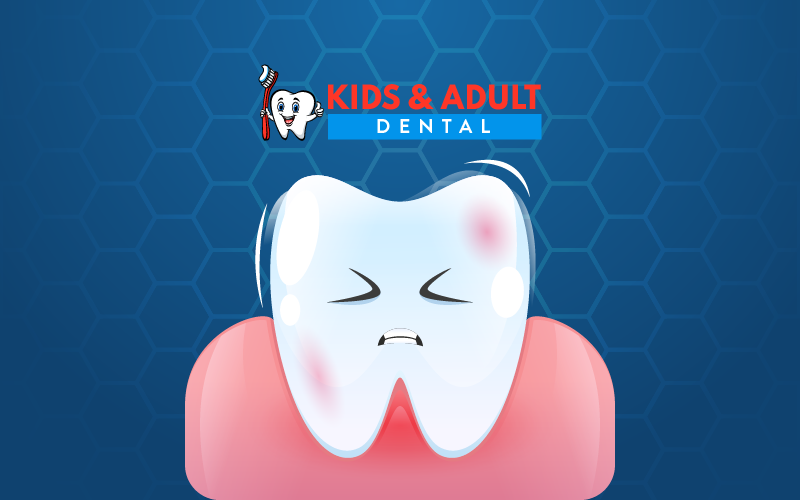A frequent dental condition known as tooth sensitivity appears as pain or discomfort in the teeth when exposed to particular stimuli, such as air, hot or cold temperatures, sweet or sour foods, and drinks. The pain can range from mild to severe and can be temporary or Persistent.
Tooth sensitivity occurs when the protective outer layer of the tooth, called the enamel, is down or and damaged, exposing the underlying layer of the tooth called dentin.
Dentin contains tiny tubes, called tubules, which connect to the nerve of the tooth. When the tubules are exposed, they allow the stimuli to reach the nerve, causing pain or discomfort.
What Causes Tooth Sensitivity?

Tooth sensitivity is a common dental problem that can cause discomfort or pain when eating or drinking hot, cold, sweet, or acidic foods and beverages. Tooth sensitivity could result from a variety of causes, such as
1. Enamel Erosion
The outer layer of the tooth, called enamel, can wear away over time due to aggressive brushing, acidic foods or drinks, or acid reflux disease. When the enamel is worn away, the sensitive inner layer of the tooth, called dentin, becomes exposed and can cause sensitivity.
2. Gum Recession
When the gums recede, the sensitive root surface of the tooth is exposed, which can lead to sensitivity. Gum recession can be caused by periodontal disease, brushing too hard, or natural aging.
3. Tooth Decay
Tooth decay can cause a cavity to form, which can expose the sensitive inner layers of the tooth and lead to sensitivity.
4. Teeth Drinding
Teeth grinding or clenching, known as bruxism, can wear down the enamel and expose the dentin, leading to sensitivity.
5. Dental Procedures
Some dental procedures, such as teeth whitening, fillings, or root canals, can cause temporary sensitivity.
Cracked or chipped teeth: If a tooth is cracked or chipped, the exposed dentin can cause sensitivity.
Read Also: Why Teeth Cleaning Have To Be Done Twice A Year?
Tips for Managing Sensitivity After Whitening

A common cosmetic dental procedure that can brighten your smile and boost your confidence is teeth whitening.
However, some people may experience tooth sensitivity after the treatment, which can be uncomfortable.
Here are some tips to help deal with sensitivity after teeth whitening:
1. Use Desensitizing Toothpaste
Desensitizing toothpaste contains compounds that can help to block pain signals from reaching the nerve of the tooth, reducing sensitivity. Use toothpaste recommended by your dentist and brush your teeth gently, avoiding harsh brushing techniques.
2. Avoid Hot and Cold Foods and Drinks
Hot and cold temperatures can exacerbate tooth sensitivity, so it’s best to avoid these types of foods and beverages until your teeth feel less sensitive.
3. Use a Soft-Bristled Toothbrush
Brushing too hard with a firm toothbrush can cause further irritation to sensitive teeth. Gently brush in a circular motion with a toothbrush with soft bristles.
4. Rinse with Salt Water
Salt water can help to soothe sensitive teeth and reduce inflammation. Rinse your mouth for 30 seconds with a cup of warm water and a teaspoon of salt.
5. Take Pain Relievers
Over-the-counter pain relievers such as ibuprofen or acetaminophen can help to reduce sensitivity and relieve pain.
6. Follow your Dentist’s Instructions
Your dentist may recommend specific post-treatment instructions to help reduce sensitivity. Follow their instructions carefully to ensure the best results and minimize discomfort.
Read Also: Why Do Dental Fillings Sometimes Need to be Replaced?
Teeth-whitening treatments and other dental services can be beneficial for maintaining good oral health and improving the appearance of your smile.
Whether you need routine checkups, preventive treatments, restorative care, or teeth-whitening procedures, If you are considering teeth-whitening treatment, be sure to call us or visit our website to book your next appointment.
With dental treatments that include dental cleaning , cosmetic dentistry, affordable tooth extraction in Denver colorado, dental fillings, and more.

